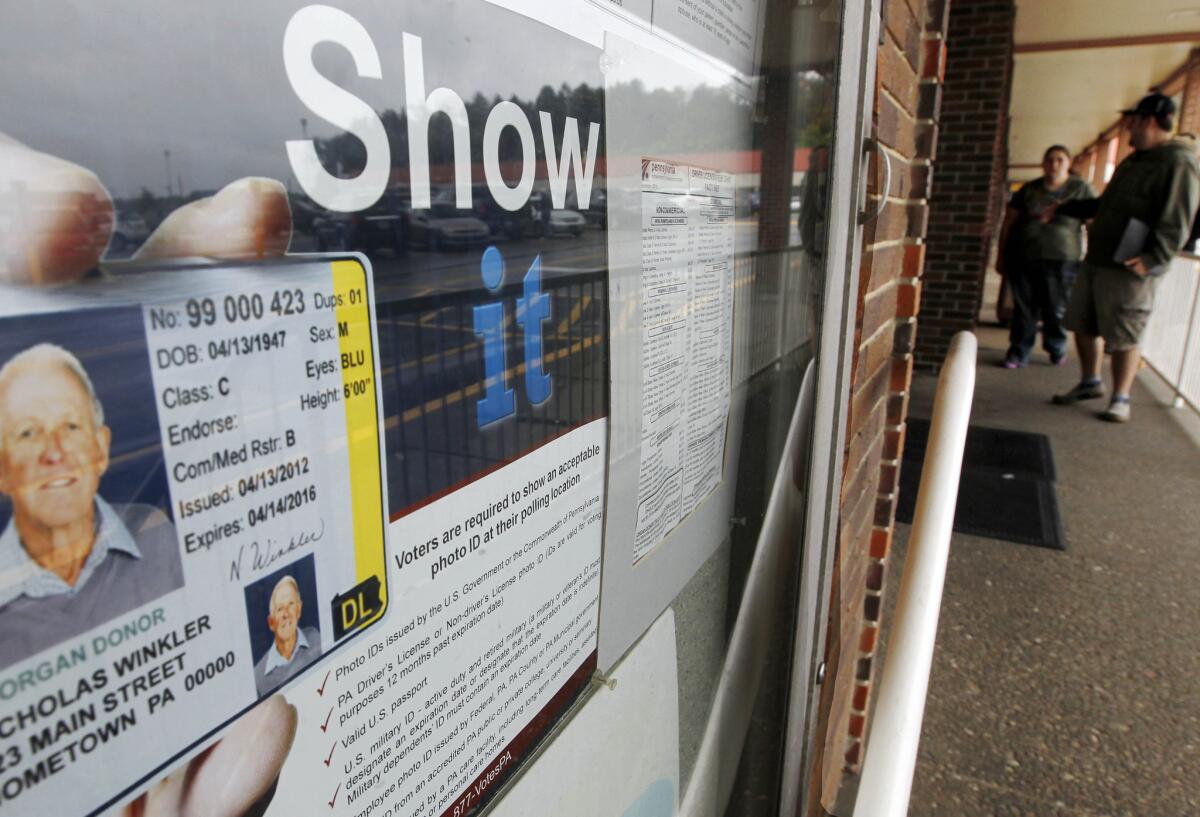Pennsylvania voter ID law struck down by judge as unconstitutional

- Share via
A Pennsylvania judge struck down the key portion of the state’s strict voter identification law, saying it unreasonably hinders people from exercising what is a fundamental right.
In a 103-page ruling, Commonwealth Court Judge Bernard L. McGinley held that the law’s requirement that the state’s 8.2 million voters show photo identification before casting a ballot was unconstitutional. The law was passed by the GOP-controlled Legislature and signed in 2012 by Gov. Tom Corbett, a Republican, despite the protest of every Democrat lawmaker.
“Voting laws are designed to assure a free and fair election; the Voter ID Law does not further this goal,” McGinley wrote in his ruling.
The law’s identification demand is unconstitutional because it does not require that a valid photo ID be convenient and available to voters, the judge explained in his ruling.
“As a constitutional prerequisite, any voter ID law must contain a mechanism for ensuring liberal access to compliant photo IDs so that the requirement … does not disenfranchise valid voters,” McGinley wrote.
The ruling, which will be appealed to a higher state court, does not strike down the entire law, but it prohibits the enforcement of its central portion, the identification rules. Enforcement had been blocked by an earlier court order, pending the resolution of the constitutional issues.
Pennsylvania has become one of the key states on the issue of voter identification laws. The Justice Department is challenging similar laws in Texas and North Carolina.
In general, Democrats have argued that such voter identification laws limit participation, particularly among the elderly, minorities, those with limited mobility through illness and the poor-- all significant constituencies for the party. Republicans have countered that tougher identification requirements are needed to prevent fraud.
Friday’s ruling comes after more than 18 months of litigation including three trials and a preliminary injunction preventing the new requirements from going into effect. In the Pennsylvania case, the state acknowledged that the stricter requirements mean that as many as 750,000 registered voters in Pennsylvania did not have an acceptable identification and could face the loss of their voting rights.
In his decision, McGinley said the state had failed to present a convincing case why the new requirement was needed. Nor could the state point to widespread fraud.
“The only fraud uncovered in this case is the ID law itself, which is exposed as a voter suppression tool adopted to game elections,” Witold Walczak, legal director of the ACLU of Pennsylvania and one of the lead attorneys challenging the state law, said in a prepared statement.
“All the evidence in the case pointed to hundreds of thousands of registered Pennsylvania voters who do not have IDs. The state is simply unable to get ID into the hands of all the people who needed it. As voter turnout continues to hit record lows, we need to make sure we do everything we can to increase participation, not deter it,” said Jennifer Clarke, executive director of the Public Interest Law Center of Philadelphia.
Gov. Corbett was expected to comment on the ruling later in the day, his office said.
The legislation was approved during a presidential election campaign and was part of GOP efforts to tighten voting requirements. Democrats fought such efforts, especially in Pennsylvania where the legislation was passed without any Democrats’ votes.
“Senate Democrats have said clearly and repeatedly that the voter ID law was an overreach that would result in the disenfranchisement of hundreds of thousands of voters,” Pennsylvania Senate Minority Leader Jay Costa, a Democrat, said in a statement.
“Simply put, it was an effort by Republicans to deny citizens access and a voice in their government that should have been dismissed,” Costa said. “Instead of trying to find ways to stop citizens from voting, we should be doing more to encourage all Pennsylvanians to participate in elections.”
During the trial phase, lawyers for the state defended the law, arguing that a multimillion-dollar publicity campaign in 2012 and the refinement of the special voting-only card by the Pennsylvania Department of State educated voters about the requirements. The state argued that it would also ensure that any registered voter who lacked an appropriate ID could get one.
But in his ruling, McGinley cited “overwhelming evidence” that hundreds of thousands of qualified voters lack the needed identification and criticized the state’s educational and marketing efforts as “largely ineffective and consistently confusing.”
The judge also said distributing the special IDs through the state Department of Transportation’s several dozen licensing centers was an inconvenience.
“In contrast to 9,300 polling places, to obtain an ID for voting purposes, a qualified elector must overcome the barrier of transport and travel to one of PennDOT’s 71 (licensing centers) during limited hours,” the judge wrote.
ALSO:
Utah says married same-sex couples can file joint tax return
From moon to Mojave: Flight center named for Neil Armstrong
Drug search involving anal probe results in $1.6-million settlement
More to Read
Sign up for Essential California
The most important California stories and recommendations in your inbox every morning.
You may occasionally receive promotional content from the Los Angeles Times.














